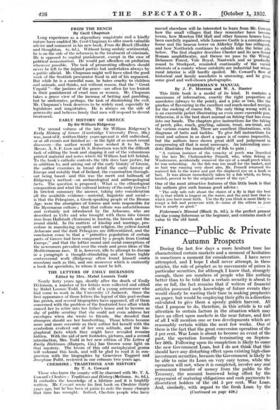EARLY HISTORY OF GREECE By Sir William Ridgeway
The second volume of the late Sir William Ridgeway's Early History of Greece (Cambridge University Press, 30s.) was, most of it, written thirty years ago and is still unfinished, or at all events not finished as—in the light of so much recent discovery—the author would have wished .it to bet To Messrs. A. S. F. Gow and D. S. Robertson was left the difficult task of editing the book and shaping it out of the voluminous printed material and notes which Sir William had left behind. To the book's catholic contents the title does bare justice, for in addition to, and arising out of the early history of Greece, the author- examines in broad detail the early history of Europe and notably that of Ireland, the examination through- out being based—and this was the merit and hallmark of Ridgeway's method—on archaeological and anthropological facts. The question is proposed : What is the ethnological composition and what the cultural history of the early Greeks ? In briefest summary the answer, taking into consideration all the available evidence—material, linguistic and social— is. that the Pelasgians, a Greek-speaking people of the Bronze Age, were the aborigines-of Greece- and were responsible for the Mycenaean culture ' • that that culture was autochthonous and certainly not introduced by the Achaeans, who are described as Celts and who brought with them into Greece iron from Hallstadt (Noricum) in Austria, the brooch and the round shield. In the matters of kinship and marriage, pro- cedure in manslaying (wergelt) and religion, the yellow-haired Aehaeans and the dark Pelasgians are differentiated, and the conclusion conic to that a " primitive. population of certain parts of Greece had been conquered by a people from Central _Europe," and that the loftier moral and social conceptions of the newcomers prevailed over the crude and gross ideas of the Mediterranean race. It is, however, idle to attempt to discuss in a paragraph a thought-stimulating and at times highly controversial work (Ridgeway often found himself contra mundum) such as this, and one moreover which is eminently a book for specialists, to whom it must be left.














































 Previous page
Previous page